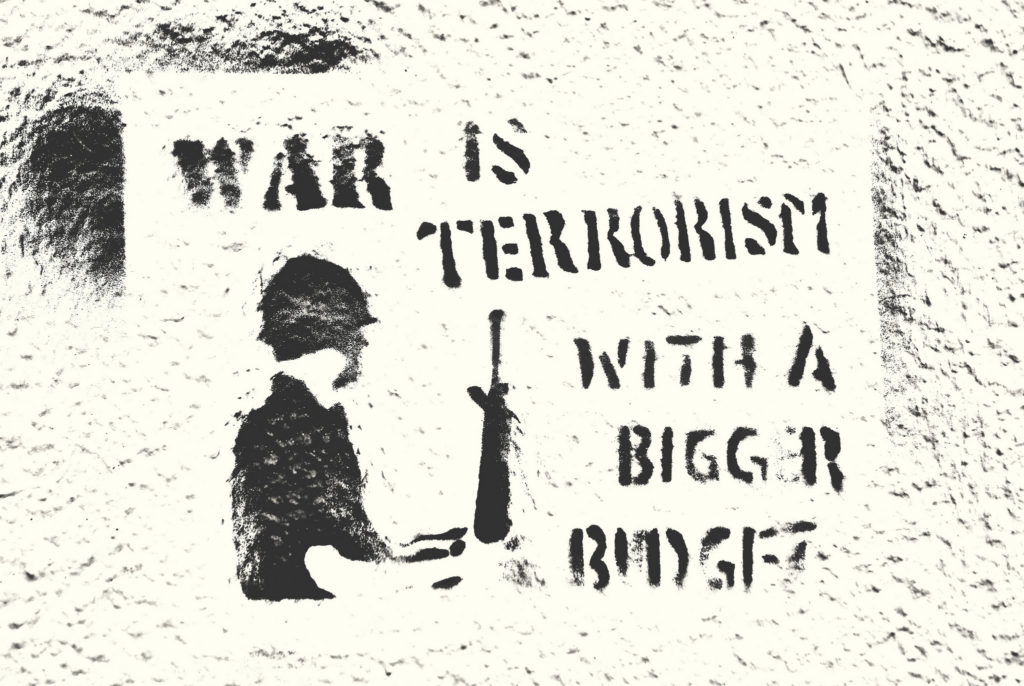Our views on war and terrorism need a drastic rethink

Wherever you look today there’s always a new article regarding terrorism. It’s taken hold of the public consciousness and has become a major concern for people around the world.
I used to consider terrorism as something done to good people by ‘the bad guys’, that the violence inflicted on ‘innocent’ people was never called for and compromise could be reached through dialogue and understanding…
While I still believe that understanding and dialogue are the ideal ways of settling disputes I now realise that some people just don’t have those tools at their disposal or, if they do, not all want to use them. These groups will inflict devastating damage on individuals and communities for their own political agenda, sometimes gaining from those that they are attacking. They dress it up in religious and moralistic attire, attempting to convince individuals to join their righteous cause of destroying the ‘enemy’. They indoctrinate people into their death cults on grounds of survival of culture and faith and yet they are nothing more than master manipulators, sending others to do their own dirty work, throwing away lives in their great crusades…
But that’s just the Governments.
We also have individuals and groups who are against these Governments using those same tactics to achieve their own political ends. It all starts to look the same after a while. Whether it’s called ‘terrorism’, ‘war’, ‘illegal war’, ‘war crimes’ the result is the same: non-militant people are being killed and murdered at the hands of those that vie for power. What is the difference between acts of terror and acts of war, anyway?
The online Oxford Dictionary defines war as “a state of armed conflict between different countries or different groups within a country”, whilst defining terrorism as “the unlawful use of violence and intimidation, especially against civilians, in the pursuit of political aims”. Although the UK Terrorism Act 2000 defines terrorism in much more detail, these two definitions will suffice for the point I am raising- war and terrorism really aren’t that different in practice.
Semantic experts will tell me that we are not technically at war with ISIS because they are not an officially recognised country or a state but we are ‘at war’ with them. You know, like how the ‘War on Drugs’ isn’t actually a war but it is.
The justification for the ‘war’ with ISIS is that they massacre ‘enemy’ men, women, and children, raping and pillaging in the name of Allah whilst treating their ‘citizens’ brutally, imposing restrictive measures on them that are against human rights. While all of that is true, North Korea could give them a tip or two on efficiency regarding citizen control.
Whilst not conflating it with ISIS-style oppression, we ought to acknowledge that recent UK government policies have also caused the deaths of many UK citizens. In 2015 death rates rose by the largest amount since World War 2 and some claim this is due to austerity. Due to the vicious back to work scheme, between 2011 and 2014 it was estimated that nearly 2,400 people died after a work assessment removed their employment and allowance support and a further 7,200 died after being judged as being ready to go back to work (although causation cannot be claimed for the latter figure, it is still worthy of note). Some claim as many as 30,000 died in 2015 as a result of an underfunded NHS. All of this is politically motivated violence against their citizens. A war against those who can’t defend themselves.
This is compared to 1,200 people killed by ISIS or ISIS related attacks outside of Iraq and Syria in the past two or so years- in the past 17 years around 126 people have died in the U.K. from terrorist attacks and that’s not just the ISIS ones. Yet in March 2017 the US-led Coalition were responsible for more Syrian civilian deaths than ISIS.
I’m not claiming that ISIS and the U.K. are exact copies of each other. I’m trying to point out that it’s about perspective, and that our foreign policy has created a hotbed for ISIS and their ilk.
Our involvement in destabilising various countries for our own gain has led to an increase in terrorism. It’s been brewing since World War 1 when Britain and France redefined boundaries in the Middle East (check out the Sykes-Picot Agreement) and encouraged conflict between peoples. More recently, our involvement in Iraq has been recognised as damaging to the region because we didn’t have an effective post-conflict plan. If we were so benign in our intentions when removing the dictator why didn’t we plan more efficiently? The civilian death toll actually increased post-war leading to over 100,000 deaths in 2004.
Still think ISIS are the only terrorists?
All countries and groups involved in ‘terrorism’ and war at the moment are playing by the same rule: domination through destruction. Regardless of all the other non-violent measures that are happening, actively bombing and killing the ‘enemy’ is leading to the deaths and displacement of millions of people. In response, the U.K. suffers ‘terror’ attacks, leading to a small number of people dying.
Are they really terror attacks, though, or has the war just reached our shores?
Terrorism does exist but not every act of politically motivated violence is terrorism. Most of what we’re suffering today is war and it’s no surprise we’re starting to experience it.
So, what can we do about it?
We could petition our MPs, boycott various funders of war, create groups to send aid to those suffering, educate others on the complexities of ‘terrorism’ and war, have open and honest conversations about ‘them’ and ‘us’, support intervention that is more likely to have beneficial results, and don’t vote for anymore neoliberal politicians.
But all of this doesn’t change the fact that we need a Government that is willing to cease trade with countries that fund terrorism, cease policies that kill their own citizens, cease using war as a cover for stealing resources, and cease valuing profit over people.
Until then, our pleas and protests for change will go unheard.




Leave a Reply